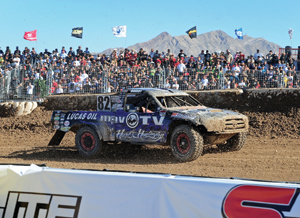Forrest Lucas spent the weeks before last night’s Super Bowl daydreaming about the images from Indianapolis that would appear on TV screens across America.
Lucas was in the midst of one such reverie two weeks ago during a trip to Charlotte. As he let his imagination roam, he leaned back in a swivel chair, closed his eyes and described a blimp shot of the brick-and-steel stadium, with the red-and-white light of a 25-foot-by-60-foot Lucas Oil sign illuminating the night.
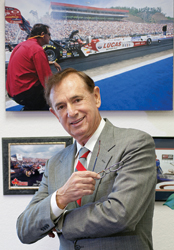 |
“We got growing real fast with the NHRA — 40 percent a year for several years,” Lucas said.
Photo by: EDDIE SANDERSON / LUCAS OIL
|
“That makes us look like a major corporation of the world,” the 69-year-old founder and owner of Lucas Oil Products said as he opened his eyes and leaned forward with a grin. “It’s the nicest, arguably, stadium in the world right there in Indianapolis with our name on it. That’s a world of attention. That’s selling.”
Lucas has always been a sales guy, and over the last two decades, his sales vision has taken a small automotive lubricant company with three employees and turned it into a multimillion-dollar operation with annual revenue that Forbes has estimated at more than $150 million. And last night was Lucas’ signature sales moment.
An audience of more than 100 million tuned in to see a game played in a stadium with his company’s name on it. Not Castrol. Not Mobil 1. Not Valvoline. But Lucas Oil.
Not bad for a former truck driver with a knack for selling and a penchant for big dreams.
■ ■ ■
Sports marketing has been central to Lucas Oil’s growth since it was first incorporated in 1989. Lucas started by buying tires and providing oil to a sprint car driver in Arkansas. He added deals with the NHRA, PBR, Indiana Pacers and others along the way, eventually cobbling together a sports sponsorship portfolio that costs more than $30 million a year (see chart). It also owns, sells sponsorships to and produces TV for seven auto and boat racing series.
“We’ve come a long way from $500 for tires,” said Bob Patison, Lucas Oil’s vice president and head of its sports marketing efforts. “We all realized the potential, but to look into a crystal ball and say this is where we’ll be 20 years from now — no one had a clue.”
At a time when the country is awash in talk of whether people can still climb the ladder from poor to rich, Lucas is one example that such a rise is possible. He grew up in central Indiana, the son of a father who struggled holding a job and a mother who worked in a textile factory. He never attended college and worked in factories until he saved enough money to attend truck-driving school and buy a tractor-trailer contract with Mayflower Transit. He eventually saved enough money to buy several trucks and create a small trucking business called Lucas Lines.
Most of the company’s work was moving freight in and out of California, and the trucks regularly broke down. Lucas wanted to find a way to make the engines last longer, so he started scouring junk yards looking for discarded oils that he would use to create engine additives. He said he eventually found an old rusty barrel that had synthetic oil that he mixed to create an additive that helped his trucks get a half-mile more gas per gallon.
Lucas, his wife, Charlotte, along with Patison, who was his attorney at the time, and a few warehouse workers mixed the additives and sold them at truck stops. After incorporating in 1989, he began looking for ways to expand Lucas Oil’s distribution. The key, he and Patison believed, was sports, so they signed their first sponsorship with an Arkansas sprint car driver named Ricky Logan. They gave Logan oil and some tires.
“That was about all we could afford,” Patison said. “When we walked into retailers in that area (of Arkansas), they were at least aware of that product name.”
From there, they added sponsorships with a monster truck driver out of Tennessee, a NASCAR modified driver and two NHRA teams. Everything changed when the NHRA needed a title sponsor for a race outside Chicago in 2001.
A month before the race, Lucas bought the race sponsorship for $150,000. It was the company’s first national sponsorship, and Lucas credits it with opening the door to conversations with key auto retailers like Auto Zone and O’Reilly Auto Parts. He later talked to the NHRA about expanding the relationship and entitling the NHRA’s second-tier drag racing series.
“They were a small company and we weren’t sure how long they would last,” said NHRA President Tom Compton. “It didn’t take long to realize they were the real deal. Long before the end of the first term, we did an extension. Each time, Forrest took on more assets and expanded the relationship. His company was growing.”
The NHRA deal propelled Lucas Oil onto the national stage and helped expand its distribution at national auto part chains.
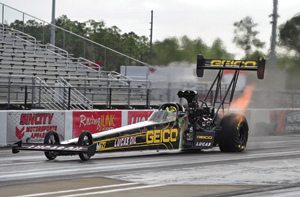 |
Lucas Oil has used a variety of motorsports associations, such as with off-road racing (top) and the NHRA (above), to help establish its footprint in sports.
Photos by: EDDIE SANDERSON / LUCAS OIL
|
“We got growing real fast with the NHRA — 40 percent a year for several years,” Lucas said. “It was real fast growth for a while.”
Lucas saw the opportunity for more growth. When the Indianapolis Colts began looking for a naming-rights sponsor in 2005 for their new stadium, Lucas was one of the first people the sales team called. Lucas Oil was a minor team sponsor and one of the few large companies in the region.
Tom Zupancic, the Colts’ former head of sales and marketing, said the team didn’t think Lucas would be interested in buying stadium naming rights and believed the initial pitch to Lucas for a 15-year deal would be a trial run for later presentations. But when the Colts’ four-hour presentation ended, Lucas piped up with a question.
“What if I want 20 years?” he asked.
Zupancic said he nearly fell out of his chair. In March 2006, Lucas signed a 20-year deal worth $122 million.
Patison described the deal as a financial stretch for Lucas Oil at the time and said he initially opposed it. The company carries no debt, he said, and he believed the money would be better spent on capital investments to improve its production capabilities.
“But the more we studied it and evaluated the potential to take Lucas Oil to the next level, it made more sense,” Patison said. “I’m glad we did. It’s proved to be a very worthwhile investment.”
Lucas took a hands-on approach to the stadium’s construction process. He often showed up at the stadium while it was being built, and he helped conceptualize the stadium’s Lucas Oil Plaza entrance: a 30,000-square-foot space that features an archway formed by two dragsters, a counter with oil products on display and an engine pulled apart and suspended on strings.
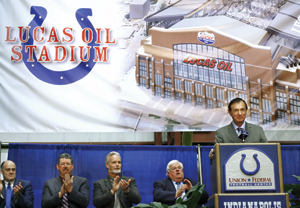 |
Forrest Lucas discusses his company’s purchase of the Colts’ stadium naming rights in 2006.
Photo by: AP IMAGES
|
“It’s probably one of the most unique areas of any stadium in the world,” Zupancic said.
As its footprint in sports expanded, Lucas Oil began buying and developing motorsports properties of its own. Beginning in 2004, it added a late model dirt series, a modified series, a drag boat racing series, a sprint car series, an off-road series and pro-pulling series. In many instances, Lucas had begun by sponsoring the respective series and then decided to replace each after they fell into financial duress and went out of existence. The investments started because Lucas wanted to keep grassroots racing alive and reach small-time racers and their fans, who he sees as the company’s core consumer.
“For the most part, it would have died without us,” Lucas said. “We propped up a lot of these series, cleaned them off, made them look nice enough on television where the channels will take them. That kept a lot of racing alive.”
Along the way, Lucas acquired a production company that began filming the events the company owned for television. Lucas believed that owning and producing TV shows would give the company more control over how its product was seen and guarantee that Lucas Oil would be featured on TV at a time when people were tuning commercials out.
His approach isn’t that different from Red Bull founder Dietrich Mateschitz’s strategy with his energy drink. Like Red Bull, Lucas Oil puts on the events, films them, repackages the content and distributes it. It also sells sponsorships to companies like Geico and Rockstar Energy, which receive signage at events and commercials on the TV broadcasts.
Last year, it bought more than 280 hours of programming across CBS, NBC, Speed and Versus (now NBC Sports Network). It also bought a small cable television channel called MAVTV for $15 million. Lucas said he did that because he was worried that there might not be a place for the company’s motorsports programming in the future.
“I think in a few years, if we can do it right with MAV, it can be making as much money as the oil does,” Lucas said. “The vision is to keep building the show until it’s good enough to get into all these (distributors). Make better shows. This is a new project for us. It will take a while.”
Today, Lucas Oil is in the process of signing international sponsorships in drag racing, power boat racing and motorcycle racing in Europe and Australia. In every deal Lucas signs, he looks for the same thing.
“He’s not into a PowerPoint presentation,” said Frank Kelleher, International Speedway Corp.’s senior director of partnership marketing, who brought on Lucas Oil as a race sponsor in 2009. “He wants to know he can move product. It’s about making the brand appear big and in a massive way.”
■ ■ ■
Despite all his success and wealth, people who work with Lucas say he remains as unassuming and modest as he was when he drove an 18-wheeler in the 1980s. He’s a man more comfortable on his cattle ranch in Missouri than walking the grounds of his estate in Indianapolis.
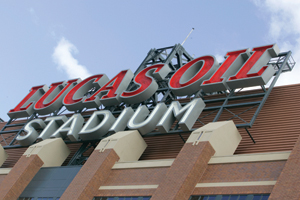 |
Photo by: TOM STRATTMAN
|
When he started a landscaping project outside Indianapolis at the 27,000-square-foot Conseco mansion that he bought for $3.5 million in 2010, his wife said he got down on his knees and laid sod with some of the workers. Part of that is because he’s a perfectionist, he didn’t want them to miss spots; part of it is because he feels more comfortable working than watching.
The day that Lucas Oil Stadium opened, he spent 14 hours standing in Lucas Oil Plaza shaking people’s hands and welcoming them to the stadium. He came back and spent 12 hours the next day.
“More than 100,000 people came to see the stadium before it opened and he wanted to put a face with a name,” Zupancic said.
Lucas’ down-home style permeates the culture of Lucas Oil. The company has a number of employees, like Patison, who have multiple family members who work for it, and every year Lucas hosts a company picnic for more than 2,000 people at its corporate headquarters in Corona, Calif.
“It’s a very family-oriented organization and they run a tight ship,” Kelleher said. “People work a lot of hours, but they all truly get along and enjoy working with the Lucas family.”
Lucas estimated he spends 40 out of 52 weekends a year at sporting events, and last night was no exception. He spent Super Bowl Sunday in his suite with about 60 guests. Many were existing clients, but there were a few potential clients with whom he discussed new business.
After all, Lucas has always been a sales guy … and a dreamer. It’s the combination that got him there in the first place, and one he plans to continue.
“We are prepared for a lot of growth,” Lucas said. “We’ll probably be doing a lot more business overseas. The last three years, I’ve done a lot of work. We’ve doubled the size of our plant (in Indiana). We can grow a lot right there. I think we will. We have the place for it. We’re ready for it when it comes.”
| Lucas Oil's sports ties |
| PROPERTY |
INITIAL YEAR |
| Lucas Oil I-10 Speedway (Blythe, Calif.)* |
2002 |
| Lucas Oil NHRA Drag Racing Series |
2002 |
| Lucas Oil Pro Pulling League |
2004 |
| "Lucas Oil...On The Edge" (Speed TV show)* |
2004 |
| Lucas Oil Speedway (Wheatland, Mo.)* |
2004 |
| Sam Schmidt Motorsports (IndyCar team) |
2005 |
| Lucas Oil Late Model Dirt Series* |
2005 |
| Lucas Oil Modified Series |
2006 |
| Lucas Oil Production Studios (Corona, Calf.)* |
2006 |
| Team Lucas* |
2006 |
| Morgan Lucas Racing (NHRA multicar team)* |
2006 |
| Indiana Pacers/Indiana Fever |
2007 |
| "Lucas Oil Motorsports Hour" (Versus/NBC Sports Network TV show)* |
2007 |
| Lucas Oil Stadium (Indianapolis) |
2008 |
| Lucas Oil AMA Motocross Championship |
2008 |
| Geico Powersports Endurocross presented by E3 Spark Plugs and Lucas Oil |
2008 |
| MAVTV* |
2008 |
| NASCAR Camping World Truck Series Lucas Oil 150 at Phoenix |
2009 |
| ARCA Lucas Oil 200 at Daytona |
2009 |
| Lucas Oil American Sprint Car Series |
2009 |
| Lucas Oil Off Road Racing Series* |
2009** |
| IHBA Lucas Oil Drag Boat Racing Series |
2009 |
| NASCAR Camping World Truck Series Lucas Oil 200 at Dover |
2010 |
| Best In The Desert Racing Association (off-road racing) |
2010 |
| Lucas Oil Raceway at Indianapolis |
2010 |
| Professional Bull Riders |
2011 |
* Owned
** Lucas Oil also had sponsorship rights to Championship Off Road Racing from 1999 to 2006 and the Lucas Oil World Series of Off Road Racing from 2007 to 2008.
Source: Lucas Oil



